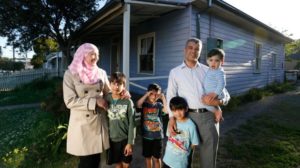Call for Australia to take more Syrian refugees
Australia should announce another extraordinary humanitarian intake of refugees from the conflict in Syria, refuge advocate groups say.
The call has come as the civil war in the country and humanitarian crisis deepens with the use of illegal chemical weapons and the number of people forced from their homes by the conflict amounts to more than 10 million people – or half Syria’s population.
The quota for Australia’s initial additional resettlement of 12,000 refugees from Syria and Iraq – which is on top of it annual humanitarian intake of 13,750 – has been filled.
According to the latest federal government figures, all of the 12,000 visas assigned have been issued and more than 10,400 refugees have already arrived in the country as part of the program.
 New Oxfam Australia’s chief executive, Dr Helen Szoke, said that, “considering the success” of Australia’s resettlement of the initial 12,000, and the ongoing outflow of refugees fleeing the conflict, the Australian government was well-placed to resettle more people.
New Oxfam Australia’s chief executive, Dr Helen Szoke, said that, “considering the success” of Australia’s resettlement of the initial 12,000, and the ongoing outflow of refugees fleeing the conflict, the Australian government was well-placed to resettle more people.
“The international community seems intent on watching on as millions of people are stuck between the rock that their country has become and the hard place that exile offers them,” she said.
“Oxfam calls on rich countries to show their support for Syria’s neighbours that have welcomed these refugees and to resettle at least the most vulnerable 10% of Syrian refugees by the end of 2017.”
A former Australian ambassador to Syria, Bob Bowker, said Australia was in a position to accept more refugees from the conflict in that country.
“I would like to see Australia doing much more to accept Syrian refugees that have been assessed as such and provide more support in local communities to assist their settling into Australia,” Mr Bowker said
Mr Bowker, who served in Damascus between 2005 and 2008, said Australia would benefit from accepting more refugees – particularly those that are well-supported in their initial months in the country – and that the experience of the current cohort was that younger refugees adapt better, and more quickly, to their new country.
But he said Australia needed to accept refugees from the conflict on the basis of those in most acute need of protection, not on any sectarian division.
“Our response needs to be based on our common humanity, not on the basis of religious affiliation,” Mr Bowker told the media.
Australia’s one-off additional resettlement program, announced by the then prime minister, Tony Abbott, in September 2015, has been widely hailed as a success, though it has not been without controversy.
Initially, the timetable of Australia’s resettlement program lagged behind comparable countries such as the US and Canada.
In the same 12 months those countries had settled 10,000 and 30,000 refugees under additional intakes respectively, Australia had accepted just 2,000.
And there were also concerns that Australia, in identifying persecuted minorities for resettlement, had preferenced Christians over Muslims.
Syria and Iraq are both Muslim-majority countries and while Christians in those nations face religious persecution, Muslims, both from sectarian minorities and majorities, are also significantly persecuted.
But large numbers of Muslim refugees have been included in the intake.
There were also concerns that, once in Australia, too many refugees were being resettled in too few areas.
Refugee community groups have responded by saying that refugees often chose to settle where they have family or community connections and state and federal governments have responded with additional funding for resettlement, health and education services.
The federal government has sought to reform and streamline its humanitarian settlement program, to prioritise integration and independence.
Central to this reform is improving English, education and employment outcomes, ensuring humanitarian arrivals have the best chance at thriving in Australia,” said the assistant minister for social services, Zed Seselja.
Syrian refugees Tawfik and Ghunwa Mira said there were many Syrians struggling to survive in neighbouring countries such as Lebanon and Jordan.
“There are many people who need help. People who can’t go home to Syria and who are struggling just to survive in these places,” they said.
“In Lebanon, Syrians refugees are treated like criminals. There is no work for them and very few services,” said the Miras who arrived in Australia just four months ago with their disabled son Yousef.
Laurie Nowell
AMES Australia Senior Journalist












